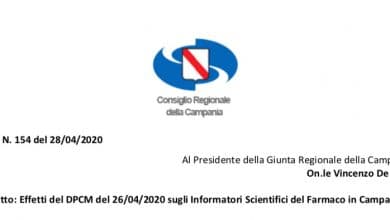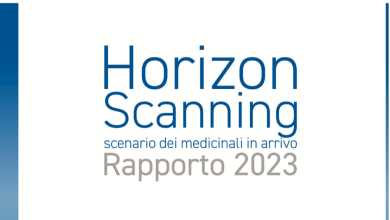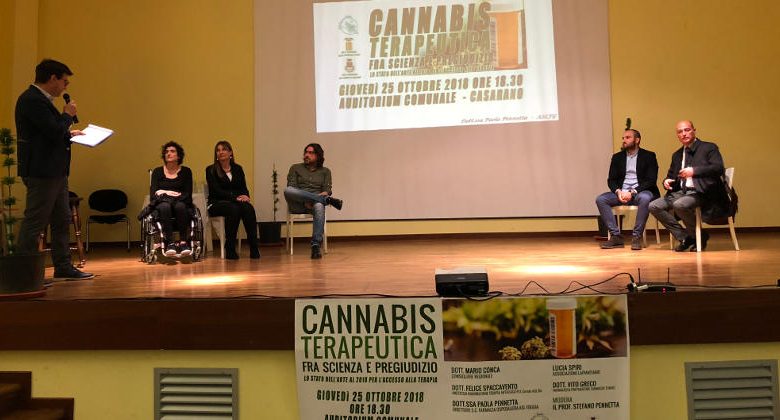
Medical cannabis: stuck between prejudice, bureaucracy and the interests of pharmaceutical companies
Lecce Sette – Friday 26 October 2018
Studies also confirm its efficacy as an anticancer agent, as well as in pain therapy and for a series of pathologies.
There are about 30,000 studies on cannabis: science tells us that it is very effective in pain therapy and for treating a whole series of pathologies, where other drugs often fail to have the same effectiveness. Yesterday, in Casarano, in the municipal Auditorium, "therapeutic cannabis" and the "state of the art in 2018 for access to therapy" were discussed, with expert guests in the field, such as Dr. Felice Spaccavento, who deals of anesthesia, resuscitation and 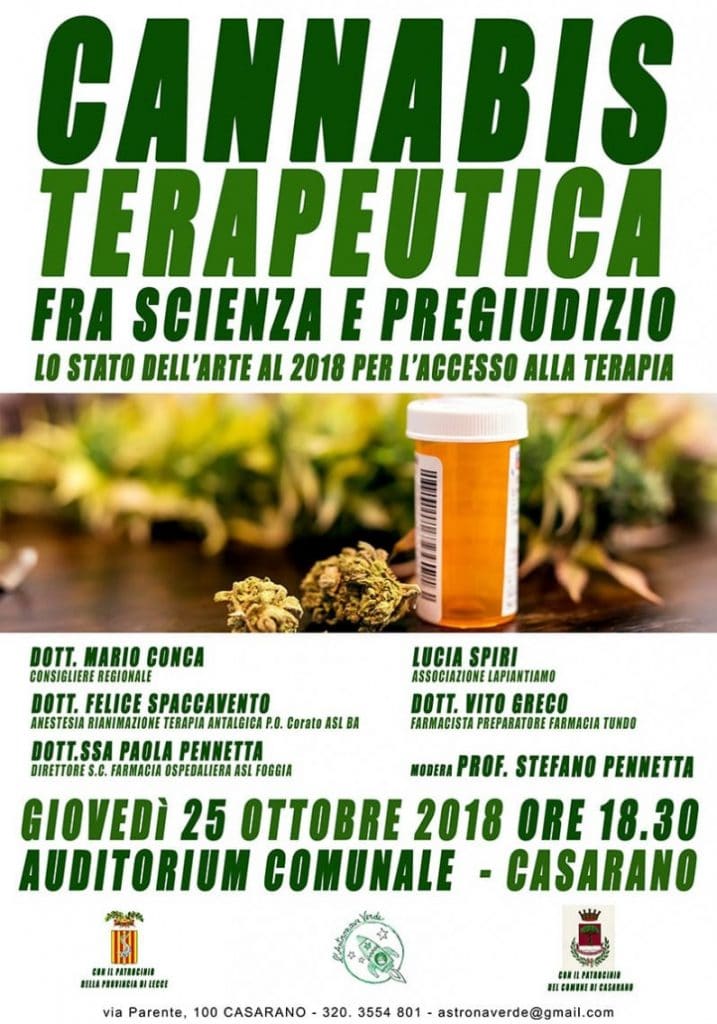 analgesic therapy in the Corato hospital. The latter himself explained that a great battle is underway, similar to the one that took place for morphine with terminal cancer patients. Even then it was difficult to prescribe this therapy which today is taken for granted, so much so that many doctors gave up. There were so many prejudices even during that battle. Today, however, science fights to make it clear that cannabis can complement and sometimes replace drugs with positive effects on the quality of life of patients with drug-resistant epilepsy, depression, headaches, AIDS, neuropathic pain, fibromyalgia, Parkinson's disease, arthritis rheumatoid, sleep disorders, anxiety, dementia and much more. Cannabis also fights nausea and vomiting due to chemotherapy. You don't heal as if it were a magical infusion, but you feel better. Cannabis is the most versatile plant in the world: it can produce medicines, textile fibers or building materials. Since ancient times (even 2000 years before Christ) it was used as an anti-inflammatory and pain reliever. Cannabis is the botanical name, which is equivalent to the Italian name “canapa”: sativa, indica and ruderalis are the best known species. Puglia was the first in Italy to introduce the therapeutic use of this medicinal herb, but still today problems of availability, bureaucratic obstacles and some doctors who, due to prejudices, hesitate too much in prescribing it and when they do, modify the doses, compromising the therapy .
analgesic therapy in the Corato hospital. The latter himself explained that a great battle is underway, similar to the one that took place for morphine with terminal cancer patients. Even then it was difficult to prescribe this therapy which today is taken for granted, so much so that many doctors gave up. There were so many prejudices even during that battle. Today, however, science fights to make it clear that cannabis can complement and sometimes replace drugs with positive effects on the quality of life of patients with drug-resistant epilepsy, depression, headaches, AIDS, neuropathic pain, fibromyalgia, Parkinson's disease, arthritis rheumatoid, sleep disorders, anxiety, dementia and much more. Cannabis also fights nausea and vomiting due to chemotherapy. You don't heal as if it were a magical infusion, but you feel better. Cannabis is the most versatile plant in the world: it can produce medicines, textile fibers or building materials. Since ancient times (even 2000 years before Christ) it was used as an anti-inflammatory and pain reliever. Cannabis is the botanical name, which is equivalent to the Italian name “canapa”: sativa, indica and ruderalis are the best known species. Puglia was the first in Italy to introduce the therapeutic use of this medicinal herb, but still today problems of availability, bureaucratic obstacles and some doctors who, due to prejudices, hesitate too much in prescribing it and when they do, modify the doses, compromising the therapy .
Anti-inflammatory and anticancer effects
Cannabis seems to have anti-inflammatory effects, as neurologist Giovanni Caggia explained in another conference we talked about. A study by researchers from China Second Military Medical University has confirmed the anti-inflammatory abilities of cannabis. Published in the journal Rheumatology, the research explains how cannabis can have therapeutic effects on joint inflammation. But today it is known that the substance released by this plant can even cure inflammation of the intestine. Now the oncological effects are being studied. “Cannabis therapy, according to recent studies, could have anticancer effects – explains Dr. Felice Spaccavento – There are some studies on brain tumors, leukemia, lung, colon and skin cancer. There are a number of works demonstrating how cannabis inhibits tumor invasion, metastasis and increases the programmed death of tumor cells. Then, the important role of cannabis as an anticancer is studied. On some brain tumors cannabis has an analgesic role, but also an appetite role (cancer patients eat more with therapeutic cannabis), a bronchodilator and muscle relaxant role”. From a pharmacological point of view, the most important principles of cannabis are the following: THC or Delta9 Tetrahydrocannabinol (analgesic, antioxidant, anti-inflammatory, antiemetic, muscle relaxant, antipruritic, bronchodilator); CBD or Cannabidiol (anxiolytic, antipsychotic, analgesic, anti-inflammatory, antioxidant, antispasmodic, anticonvulsant, cytotoxic); CBC or Cannabichromene (anti-inflammatory, analgesic, antifungal, antibiotic, antidepressant); CBG or Cannabigerol (anti-inflammatory, analgesic, antifungal, antibiotic); CBN or Cannabinol (sedative, antibiotic, anticonvulsant, anti-inflammatory).
The great battle of Lucia Spiri, who with the association "Lapiantiamo" helps patients to be treated with cannabis
The Casarano meeting was also important for the direct testimony that Lucia Spiri, founder of the "Lapiantiamo" association, was able to offer, interviewed by professor Stefano Pennetta, moderator of the conference. TO 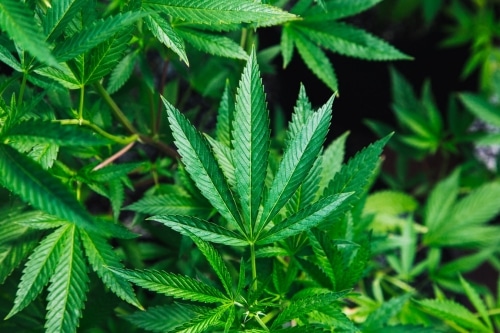 she was diagnosed with multiple sclerosis in 2000, which then became drug resistant. For years Lucia Spiri has been cured by smoking cannabis. “Now I'm better – she explained moved – At the beginning nobody believed in this therapy with cannabinoids. Today the magnetic resonance shows no lesions: the disease has stopped. My association was born to give support to patients who want to be treated with cannabis: there are currently 400 in the province of Lecce. Now I have replaced the meds with supplements, vitamins and cannabis. The side effects are dizziness, but they are still acceptable". The Puglia Region is focusing on the production of cannabis, which is currently only produced in the Military Chemical Plant of Florence. The authorization process has already started to acquire its own production. In the past it happened that Italy got its supplies from Holland because the production of Florence was not enough.
she was diagnosed with multiple sclerosis in 2000, which then became drug resistant. For years Lucia Spiri has been cured by smoking cannabis. “Now I'm better – she explained moved – At the beginning nobody believed in this therapy with cannabinoids. Today the magnetic resonance shows no lesions: the disease has stopped. My association was born to give support to patients who want to be treated with cannabis: there are currently 400 in the province of Lecce. Now I have replaced the meds with supplements, vitamins and cannabis. The side effects are dizziness, but they are still acceptable". The Puglia Region is focusing on the production of cannabis, which is currently only produced in the Military Chemical Plant of Florence. The authorization process has already started to acquire its own production. In the past it happened that Italy got its supplies from Holland because the production of Florence was not enough.
The discoveries of Professor Raphael Mechoulam: there are endogenous cannabinoids in our body
Professor Raphael Mechoulam has made a great contribution to the study of cannabis: he has highlighted that in our body there are endogenous cannabinoids (anandamite, 2-AG-Arachidoglycerol, lipidic metabolites-PEA) which bind to receptors already predisposed in our body to receive them (eCB1- CNS; immunomodulatory eCB2; TRPV1; PPAR's; GPR55). Therefore, in the body we have endogenous cannabinoids to which we can combine exogenous cannabinoids, i.e. cannabis. “We are already prepared to use this substance. Thirty years ago those who prescribed morphine were looked down upon. Today it is prescribed on the white recipe. The same battle is fought for cannabinoids” – says Dr. Spaccavento, while explaining the discoveries of Professor Mechoulam – The brain is impregnated with cannabinoid receptors”. Cannabis through overheating makes its active ingredients therapeutic. The hemp plant is made up of about 700 substances of which 200 are cannabinoids, then there are other substances which are terpenes, which give a whole series of beneficial and anti-inflammatory effects. These substances have a positive “cumulative” effect.
Cannabis, side effects
There are no deaths with cannabis, while there are deaths even with the side effects of Tachipirina, as Dr. Paola Pennetta, director of the ASL hospital pharmacy in Foggia, explained during the Casarano conference. Cannabinol is the element that performs the function of altering consciousness. Professor Lester Grinspoon has claimed that cannabis is the least toxic drug in the world. “The law provides that cannabis should not be a first choice treatment in pain: it is expected that it is used only as a second choice – explains Dr. Pennetta – This substance with the law of the Puglia Region is free in a whole series of cases. Anyone can grow cannabis, but with seeds sold by authorized shops". The side effects vary from person to person: from headaches, exhaustion, addiction and dizziness. It is clear that the therapy must be controlled by a doctor and reviewed from time to time.
The role of the pharmacist
The role of the pharmacist is important. “Cannabis is not soluble in water, only in oil. The preparation cannot be left in the hands of a patient – pointed out Dr. Vito Greco, preparatory pharmacist of the TUNDO pharmacy – It is the pharmacist's job to prepare and ensure that the patient can use the product well.
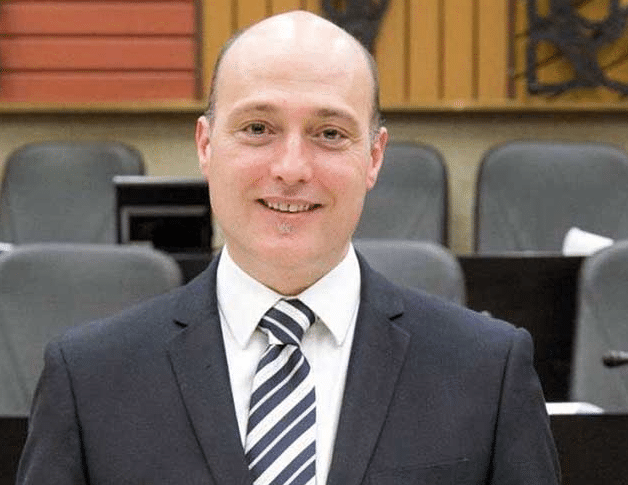 Oil and steam have immediate effects unlike capsules, which however can be more comfortable for many patients".
Oil and steam have immediate effects unlike capsules, which however can be more comfortable for many patients".
The conclusions of Mario Conca, regional councilor M5S: "Difficult life for patients because cannabis is not convenient for pharmaceutical industries"
The adviser Mario Conca (M5S) concluded the round of speeches by explaining that too often patients find themselves struggling with bureaucracy, hesitant doctors and a whole series of difficulties partly due to prejudices, but also "because cannabis is not convenient for pharmaceutical industries". On paper there is a 2014 law and on the other there are the general practitioners who modify the prescriptions of specialists downwards. “The real side effect is that it hurts the coffers of pharmaceutical companies” – explained the regional councilor Mario Conca. There would be economic interests behind this curb on a therapy that up to now has shown to only give advantages in many fields. “A plant does not bring in the money for a chemical product, a drug, with the whole world ofscientific informants that goes around" continued the adviser. “There is still a long way to go to make life easier for medical cannabis users. The Puglia Region wants to be the first again this time: the aim is to de-bureaucratise this therapy, making it easily usable, and starting regional production, processing and distribution that will mark the turning point. Let's hope we don't have to wait too long."
Gaetano Gorgoni
Related news. Puglia region. Mario Conca


